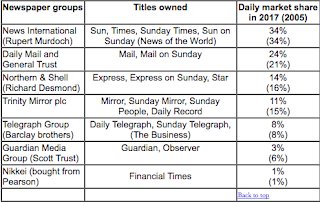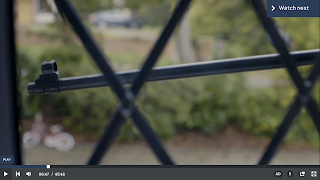Mock
"How far can aspects of identity be seen to affect the way in which audiences use online media? Discuss, with reference to Zoella and Attitude" (30)
PLAN
- Intro (people forming identity through the ideologies presented by each product, strongly affect the use)
- Para 1 (mention GAUNTLET pnm theory, how hyperlinks and interactivity allow for people to choose what they are watching, articles etc.)
- Para 2/3 (use examples from Zoella apartment and holiday/cult beauty blog posts, how she presents an ideology of lifestyle and beauty, conforms to gender hegenomy, also BEGER theory of men act, women appear and BEUDRILLARD and post-modernism as she is creating a hyperreal lifestyle)
- Para 3/4 (use examples from Attitude magazine of their exercise posts and fashion or the article on body image #queeraf and theatre section, how they target an audience described as 'gay professionals' and construct an ideology around expensive brands due to expendable income, BUTLER and theories of gender performativity)
- Concl.
Within online media, there are several platforms which people can explore. Each of these presents separate ideological perspectives, which audiences take and form their identity through. The use of online media therefore is strongly affected by the way people see themselves, and identity plays a key role within the way audiences interact with it and use it.
To begin with, online media is much more interactive than other forms of media, which is made possible through multimodality and hyperlinks. What this creates is hypermodality, where the audience is able to choose exactly what they want to look at, and can then explore similar topics which are available through hyperlinks on the website. This puts into practice David Gauntlet's "pick and mix" theory, in which an audience is not passive as they choose what they expose themselves to and choose to identify with. Therefore, audiences are able to form their identities through things that they enjoy as opposed to being passive in which the audience is simple influenced by the media with no conscious choice.
Within the past 10 years, there has been a rise in what is called the "influencer". These are people who use online media in order to publish their own content on lifestyle, makeup, fashion, or simply hobbies for people to consume, and thereby form their identity based off what they have seen. One influencer who has become particularly popular is Zoe Sugg, also known through the brand "Zoella". Essentially, she is selling an aspirational lifestyle which revolves around beauty and home life, and therefore conforms to patriarchal hegenomy of women simply being cooks, keeping a tidy home or presenting themselves well for men in order to be seen as attractive. By applying Berger's theory, she conforms to the ideology that men act, and women appear - this is because she is using aspects of the male gaze (i.e by using makeup to portray beauty) and by conforming to stereotypes that women do not work (act) and therefore the best use of their time is to keep their house clean and present it nicely. This is reinforced by her content on her blog, such as her 'Cult Beauty' posts, as well as her youtube 'Get Ready With Me' videos. Within this type of content, she reviews and puts on makeup, something that is hegemonically seen as being a way of women to become more attractive for the purpose of attracting men. By reviewing such expensive products, she also presents the ideology that women should go to whatever cost to be attractive, and she very rarely promotes natural beauty of any kind.
As well as conforming to these outdated stereotypes, Zoella and many other influencers advertise products for other companies or even come up with their own ranges. Zoe has aptly named her brand "Zoella", and in her 'Zoella Apartment' video we can see that she has rented a whole apartment to launch/advertise her own products. It is all very girly, and the use of bright, white walls emphasises how she is portraying this perfect atmosphere as white connotes to cleanliness and purity. What is also interesting about this video is the way that Zoe presents her products to the audience - she talks about how good they are, and by getting her boyfriend Alfie behind the camera, it makes her seem even more as though she is advertising the product rather than being the personable Zoe that normally appears behind the camera, as the audience is no longer positioned in front of her head and shoulders in an equal and conversational way, but she is now separated due to her position and her mode of address. What Zoella, and many other influencers are doing when advertising, is they are supposedly displaying their opinions. However, sometimes this is not clear and therefore consumers may be confused as to what is their real opinion or if they are telling the audience it is a quality product in order to make money. This blurs the lines between what is real and what is a performance, and brings into effect Baudrillard's theories of postmodernism. Here, he is saying that in an increasingly modern world, and with technology being so integrated within our society, people no longer know the difference between what is real and what is not. People may construct their identities through these hyperreal representations, and if they are influenced in this way they may want to buy the product in order to identify with the person they are viewing.
Within 'Attitude' magazine, gay stereotypes are rarely subverted. One of they key focusses of this magazine is the emphasis of semi-nude male models posing in a provocative way, for example in their exercise section and also used as banners on their social media profiles. This displays the ideology that gay men should be concerned about their physical appearance, something that is constantly associated with homosexuals in society. The magazine itself targets the audience of 'gay professionals', which suggests that they expect their readers to have a large amount of expendable income. Their focus on high-quality fashion brands reflects this, with brands such as Fendi and Versace being featured in several articles. Because of this ideology, the audience would use the products to form their identity as they would pick certain fashion styles based on what the magazine says, and would buy the products from the attitude.com website through hyperlinks to the products - this means that people can directly buy what they see and not have to spend time searching for it. However, whilst conforming in these ways, they also subverts stereotypical views of gay men through their article on Body Image within the West End. The images within the article use the mise-en-scene of a grey raincoat and an umbrella, which is an intertextual reference to 'Singing in the Rain', an old and popular theatre show. However, the feminine attribute of having negative body image is a much more feminine characteristic, and also subverts the ideology of gay men having to most confidence. This links to Judith Butler's theories of gender performativity, in which people choose to display their gender or their identity through their behaviours and what they portray to others. In this article, for example, he is displaying a more hegemonically feminine side through speaking of his body image and also his interest in dancing and theatre. By having even just one article about this, it makes the magazine quite inclusive and people who identify in this way rather than the stereotypically 'butch' gay man are able to be satisfied without having to sacrifice other aspects of their identity, such as their fashion sense, as it can all be found on the same website, however they can choose what they want to see.
Overall, it is clear that people's identities highly affect the way the use online media as they are able to pick and choose what they see, as well as being able to use hyperlinks in order to access other similar interests, for example links to products Zoella recommends in the bio of her videos or the links to fashion brands in Attitude's articles. As well as this, the vast choice available on online media means that people can continue exploring until they are satisfied by what they have found, and can therefore form their identities through new things they may not have been exposed to however now they have explored it, they may be interested to delve further. This means there is high potential for profit within online media services, as there are so many different ways to appeal to an audience and keep them engaged through products that they think audiences may be interested in, based on the people they follow and watch or magazines they read.



Comments
Post a Comment